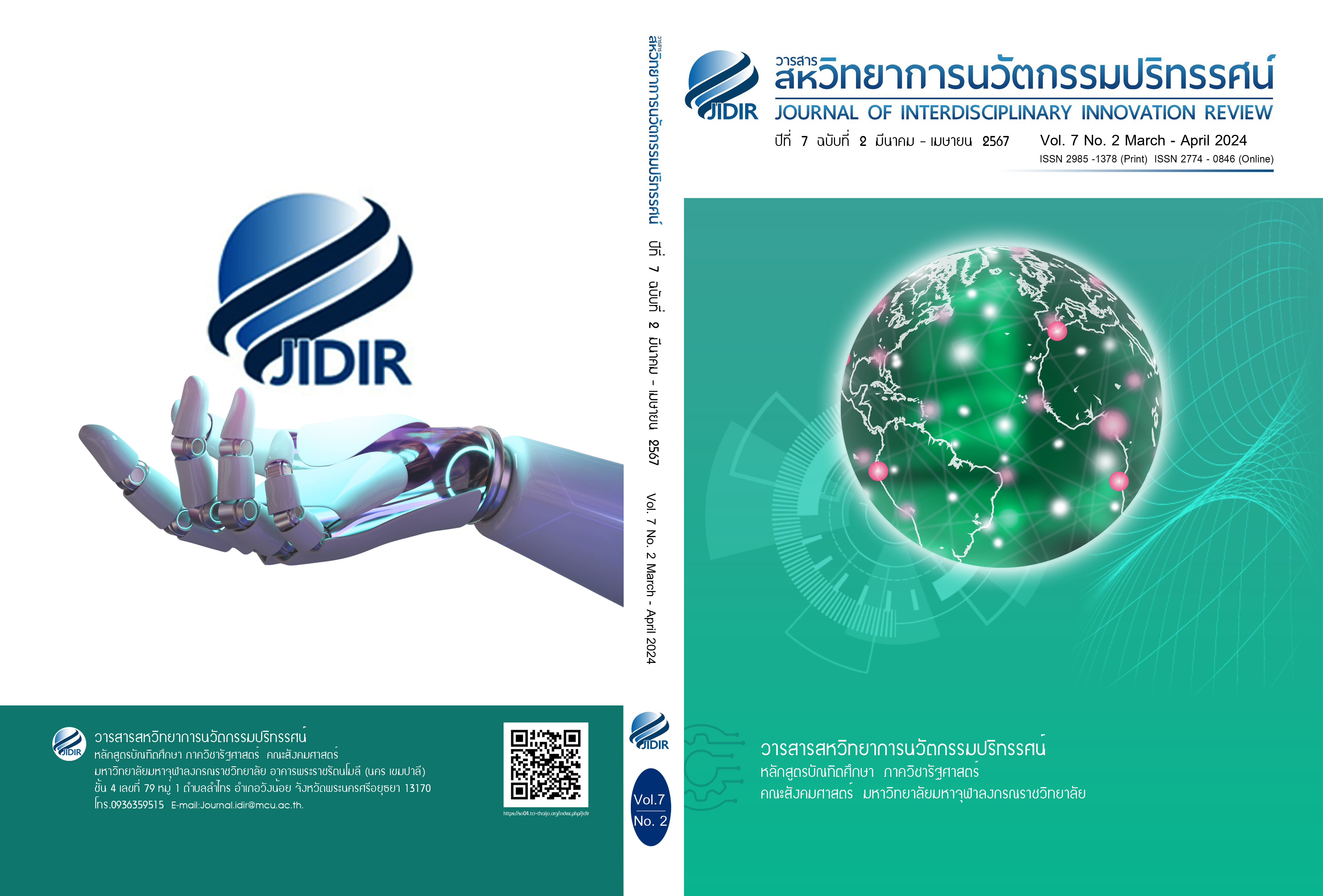การเสริมศักยภาพองค์กรเพื่อสังคม: กลยุทธ์ที่ครอบคลุมเพื่อการพัฒนาชุมชนที่ยั่งยืน
คำสำคัญ:
กิจการเพื่อสังคม, องค์กรเพื่อสังคม, กลยุทธ์ที่ครอบคลุม, การพัฒนาชุมชนที่ยั่งยืนบทคัดย่อ
บทความวิชาการนี้เพื่อนำเสนอการเสริมศักยภาพองค์กรเพื่อสังคม: กลยุทธ์ที่ครอบคลุมเพื่อการพัฒนาชุมชนที่ยั่งยืน ผลการศึกษาพบว่า กลยุทธ์ที่ครอบคลุมในการสนับสนุนกิจการเพื่อสังคม ได้แก่ จัดตั้งสถาบันเฉพาะทางที่ให้เงินทุน ให้คำปรึกษาและความร่วมมือระดับโลก ปรับปรุงด้านการศึกษาผสมผสานแนวทางปฏิบัติทางธุรกิจเพื่อสังคมและส่งเสริมวิสาหกิจโดยใช้ผลการวิจัยเพื่อสร้างความก้าวหน้า ผู้กำหนดนโยบายช่วยเหลือเพื่อการปรับตัวในท้องถิ่น สนับสนุนทางการเงิน และแบ่งปันความรู้จากการสนับสนุนจากความตระหนักรู้ของสาธารณะ มีสภาพแวดล้อมทางธุรกิจที่เอื้ออำนวย ทำให้มั่นใจได้ถึงกฎระเบียบที่มั่นคง การเข้าถึงทางการเงินและการสนับสนุนด้านนวัตกรรม พันธบัตรที่ส่งผลกระทบทางสังคมและจัดหาเงินทุนที่สำคัญ เน้นผลลัพธ์ทางสังคมที่กำหนดไว้ล่วงหน้า การเปลี่ยนแปลงทางกฎหมายช่วยให้รัฐมีเงินทุนและการบริจาคเพื่อการจัดการกองทุนกิจการเพื่อสังคมที่มีประสิทธิภาพและส่งเสริมระบบนิเวศที่เจริญก้าวหน้า องค์ความรู้ใหม่ในรูปแบบ 4E-3S-G คือ (1) E: การจัดตั้งสถาบันกิจการเพื่อสังคม (2) E: การพัฒนาการศึกษาและการใช้ประโยชน์การวิจัย (3) E: การขยายผลกระทบทางสังคม (4) E: สภาพแวดล้อมของการดำเนินธุรกิจที่เอื้ออำนวย (5) S: การสนับสนุนการเข้าสู่ตลาด (6) S: พันธบัตรเพื่อผลกระทบทางสังคม (7) S: แหล่งที่มาของเงินทุนที่หลากหลาย (8) G: การสนับสนุนของภาครัฐสำหรับกองทุนวิสาหกิจเพื่อสังคม การแก้ปัญหาและส่งเสริมกิจการเพื่อสังคมมีส่วนช่วยให้ชุมชนท้องถิ่นมีความยั่งยืน เสริมศักยภาพกิจการเพื่อสังคมผ่านกลยุทธ์ที่ครอบคลุม.
สรุปได้ว่า กลยุทธ์ที่นำเสนอเกี่ยวข้องกับการจัดตั้งสถาบันเฉพาะสำหรับกิจการเพื่อสังคม การบูรณาการ ปรับปรุงการศึกษา การใช้ผลการวิจัย และการดำเนินการเปลี่ยนแปลงนโยบาย สภาพแวดล้อมทางธุรกิจที่เอื้ออำนวยได้รับการส่งเสริมผ่านกฎระเบียบที่มั่นคงและการเข้าถึงทางการเงิน โดยมีพันธบัตรผลกระทบทางสังคมที่ให้เงินทุนสนับสนุน แหล่งเงินทุนที่หลากหลาย การเปลี่ยนแปลงทางกฎหมาย และการสนับสนุนจากรัฐบาลสร้างระบบนิเวศที่เจริญรุ่งเรือง เพิ่มศักยภาพให้กับกิจการเพื่อสังคมเพื่อความยั่งยืนของชุมชน
เอกสารอ้างอิง
Ababtain, A.K. & Akinwale, Y.O. (2019). The Role of Entrepreneurship Education and University Environment on Entrepreneurial Interest of MBA Students in Saudi Arabia. Journal of Economics and Sustainable Development, 10(4), 45-56.
Austin, J.E. & Seitanidi, M.M. (2012). Collaborative Value Creation: A Review of Partnering Between Nonprofits and Businesses: Part I. Value Creation Spectrum and Collaboration Stages. Nonprofit and Voluntary Sector Quarterly, 41(5), 726-758.
Bandyopadhyay, C. & Ray, S. (2018). Responsible Marketing: Can Social Enterprises Show the Way? Journal of Nonprofit & Public Sector Marketing, 31(2), 164-183.
Bansal, S., Garg, I. & Sharma, G.D. (2019). Social Entrepreneurship as a Path for Social Change and Driver of Sustainable Development: A Systematic Review and Research Agenda. Sustainability, 11(4), 1091 https://doi.org/10.3390/su11041091
Blanda, J. & Urbancikova, N. (2020). Social Entrepreneurship as a Tool of Sustainable Development. Quality Innovation Prosperity, 24(3), 21-36.
Bozhikin, I., Macke, J. & Costa, L.F.D. (2019). The role of government and key non-state actors in social entrepreneurship: A systematic literature review. Journal of Cleaner Production, 226, 730-747.
Broccardo, E., Mazzuca, M. & Frigotto, M.L. (2019). Social impact bonds: The evolution of research and a review of the academic literature. Corporate Social Responsibility and Environmental Management, 27(3), 1316-1332.
Choi, D., Berry, F.S. & Ghadimi, A. (2019). Policy Design and Achieving Social Outcomes: A Comparative Analysis of Social Enterprise Policy. Public Administration Review, 80(3), 494-505.
Dacin, P.A., Dacin, M.T. & Matear, M. (2010). Social Entrepreneurship: Why We Don’t Need a New Theory and How We Move Forward from Here. Academy of Management Perspectives, 24(3), 37-57.
Dees, J.G. (2007). Taking Social Entrepreneurship Seriously. Society, 4(1), 24-31.
Defourny, J. & Nyssens, M. (2010). Conceptions of Social Enterprise and Social Entrepreneurship in Europe and the United States: Convergences and Divergences. Journal of Social Entrepreneurship, 1(1), 32-53.
Distanont, A., Khongmalai, O. & Distanont, S. (2017). Innovations in a social enterprise in Thailand. Kasetsart Journal of Social Sciences, 40(2), 411–419.
Doherty, B., Haugh, H. & Lyon, F. (2014). Social Enterprises as Hybrid Organizations: A Review and Research Agenda. International Journal of Management Reviews, 16(4), 417-436.
European Commission. (2023). Social enterprises. Retrieved December 20, 2023, https://single-market-economy.ec.europa.eu/sectors/proximity-and-social-economy/social-economy-eu/social-enterprises_en
Fraser, A., Tan, S., Lagarde, M. & Mays, N. (2016). Narratives of Promise, Narratives of Caution: A Review of the Literature on Social Impact Bonds. Social Policy & Administration, 52(1), 4-28.
International Labour Organization. (2017). Promoting Social Entrepreneurship and Social Capital, A Practice Guide to Supporting Social Entrepreneurship and Inclusiveness in Rural Communities. Geneva: International Labour Organization.
Jackson, E.T. (2013). Evaluating social impact bonds: questions, challenges, innovations, and possibilities in measuring outcomes in impact investing. Community Development, 44(5), 608-616.
Jang, Y., Lee, W.J. & Hadley, B. (2020). Interactive Effects of Business Environment Assessment and Institutional Programs on Opportunity Entrepreneurship. Sustainability, 12(13), 5280.
Kabanda, G. (2019). Study on “Building Social Business: The New Kind of Capitalism That Serves Humanity’s Most Pressing Needs” by Muhammad Yunus. Asian Journal of Management, Engineering & Computer Sciences, 4(1), 36-43.
Ketprapakorn, N. & Kantabutra, S. (2019). Sustainable Social Enterprise Model: Relationships and Consequences. Sustainability, 11(14), 3772.
Kosmynin, M. (2022). Social entrepreneurship organizations and collaboration: taking stock and looking forward. International Journal of Entrepreneurial Behavior & Research, 28(2), 441-470.
Kotler, P. & Keller, K.L. (2016). Marketing Management. Pearson Education.
Lyne, I. (2017). Social enterprise and community development: theory into practice in two Cambodian villages (Thesis of Doctor Philosophy). Sydney: Western Sydney University.
Mair, J. & Marti, I. (2006). Social entrepreneurship research: A source of explanation, prediction, and delight. Journal of World Business, 41(1), 36-44.
Martin, R.L. & Osberg, S. (2015). Getting Beyond Better: How Social Entrepreneurship Works. Brighton: Harvard Business Review Press.
McIntyre, R. (2018). The Development of Social Economy in France Since 1945. Forum for Social Economics, 47(2), 253-261.
Mowery, D.C. & Sampat, B.N. (2004). The Bayh-Dole Act of 1980 and University–Industry Technology Transfer: A Model for Other OECD Governments? The Journal of Technology Transfer, 31, 115-127.
Nguyen, L., Szkudlarek, B. & Seymour, R.G. (2015). Social impact measurement in social enterprises: An interdependence perspective. Canadian Journal of Administrative Sciences, 32(4), 224-237.
Nicholls, A. (2008). Social Entrepreneurship: New Models of Sustainable Social Change. United Kingdom: Oxford University Press.
Noikoot, P. (2021). Social Impact Bonds: An Innovative Financial to Deliver Public Services for Solving Social Problems. Political Science and Public Administration Journal, 12(1), 337–356.
Nuchpiam, P., Prateeppornnarong, D. & Jenjarrussakul, B. (2018). Social Enterprise in Thailand: Some Observations on the Social Enterprise Promotion Bill. Journal of Thai Ombudsman, 11(1), 109-141.
Office of National Higher Education Science Research and Innovation Policy Council. (2023). Mechanisms for Promoting and Developing Social Enterprises to Create Sustainability Locally through Education, Science, Research, and Innovation. Office of National Higher Education Science Research and Innovation Policy Council.
Osterwalder, A. & Pigneur, Y. (2010). Business Model Generation: A Handbook for Visionaries, Game Changers, and Challengers. Hoboken: John Wiley & Sons.
Peredo, A.M. & McLean, M. (2006). Social Entrepreneurship: A Critical Review of the Concept. Journal of World Business, 41(1), 56-65.
Rana, M.S. (2023). The Rise of Social Entrepreneurship: Innovations in Creating Sustainable Impact in Bangladesh. Retrieved December 20, 2023, https://www.linkedin.com/pulse/rise-social-entrepreneurship-innovations-creating-muhammad-sohel-rana
Roger, L.M. & Osberg, S. (2007). Social Entrepreneurship: The Case for Definition. Retrieved December 20, 2023, https://ssir.org/articles/entry/social_entrepreneurship_the_case_for_definition
Sabella, A.R. & Eid, N. (2016). A Strategic Perspective of Social Enterprise Sustainability. Journal of General Management, 41(4), 71-89.
Seelos, C. & Mair, J. (2005). Social Entrepreneurship: Creating New Business Models to Serve the Poor. Business Horizons, 48(3), 241-246.
Skivko, M. (2021). Digital Technologies, Social Entrepreneurship and Governance for Sustainable Development. Research in Social Change, 13(1), 165 – 173.
Suwanaopas, R., Piriyakul, R. & Chinundej, N. (2018). Effects of Social Enterprise Strategy, Organizational Culture and Knowledge Management on the Triple Bottom Line: The Evidence of Thai Social Enterprise. Ph.D. In Social Sciences Journal, 8(3), 214–229.
The European Commission’s DG Employment, Social Affairs, and Inclusion. (2016). Social Impact Bonds: State of Play & Lessons Learnt. The European Commission’s DG Employment, Social Affairs, and Inclusion.
The National Social Enterprise Promotion Committee. (2020). Global Social Enterprise: The State of Social Enterprise in Thailand. Retrieved December 20, 2023, https://www.britishcouncil.org/sites/default/files/state_of_social_enterprise_in_thailand_2020_final_web.pdf
Visser, W. & Nick, T. (2010). The World Guide to CSR: A Country-by-Country Analysis of Corporate Sustainability and Responsibility. Austin. Texas: Greenleaf Publishing.
Wilber, C. (2004). Ethics, human behavior, and the methodology of social economics. Forum for Social Economics, 33(2), 19-50.
Yankson, H. (2023). Marketing: Key differences every Marketer should know. Retrieved December 20, 2023, https://www.linkedin.com/pulse/b2b-vs-b2c-social-media-marketing-key-differences-every-yankson
Yimwilai, A. (2015). The Integration of Social Enterprise and Sufficiency Economy: Cases of Social Enterprises in Thailand (Dissertation of Doctor of Public Administration). National Institute of Development Administration.
Yunus, M. (2010). Building Social Business: The New Kind of Capitalism that Serves Humanity's Most Pressing Needs. New York: Public Affairs.
ดาวน์โหลด
เผยแพร่แล้ว
รูปแบบการอ้างอิง
ฉบับ
ประเภทบทความ
สัญญาอนุญาต
ลิขสิทธิ์ (c) 2024 วารสารสหวิทยาการนวัตกรรมปริทรรศน์

อนุญาตภายใต้เงื่อนไข Creative Commons Attribution-NonCommercial-NoDerivatives 4.0 International License.
เพื่อให้เป็นไปตามกฎหมายลิขสิทธิ์ ผู้นิพนธ์ทุกท่านต้องลงลายมือชื่อในแบบฟอร์มใบมอบลิขสิทธิ์บทความให้แก่วารสารฯ พร้อมกับบทความต้นฉบับที่ได้แก้ไขครั้งสุดท้าย นอกจากนี้ ผู้นิพนธ์ทุกท่านต้องยืนยันว่าบทความต้นฉบับที่ส่งมาตีพิมพ์นั้น ได้ส่งมาตีพิมพ์เฉพาะในวารสารสหวิทยาการนวัตกรรมปริทรรศน์ เพียงแห่งเดียวเท่านั้น หากมีการใช้ภาพหรือตารางหรือเนื้อหาอื่นๆ ของผู้นิพนธ์อื่นที่ปรากฏในสิ่งตีพิมพ์อื่นมาแล้ว ผู้นิพนธ์ต้องขออนุญาตเจ้าของลิขสิทธิ์ก่อน พร้อมทั้งแสดงหนังสือที่ได้รับการยินยอมต่อบรรณาธิการ ก่อนที่บทความจะได้รับการตีพิมพ์ หากไม่เป็นไปตามข้อกำหนดเบื้องต้น ทางวารสารจะถอดบทความของท่านออกโดยไม่มีข้อยกเว้นใดๆ ทั้งสิ้น






